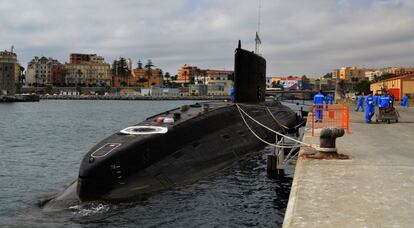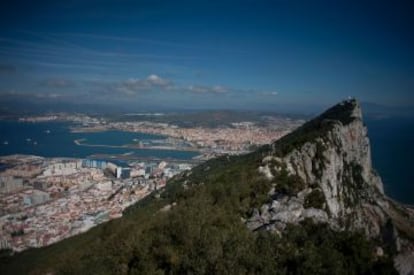Ceuta: an unofficial Russian naval ‘base’ in the Strait of Gibraltar?
Right-wing groups in the US and UK criticize frequent stopovers in the Spanish exclave


Eleven members of the European Parliament have complained to the EU’s foreign policy chief, Federica Mogherini, about the Russian navy’s frequent stopovers in the Spanish north African exclave of Ceuta.
The delegation of MEPs, which includes Catalan politician Ramón Tremosa and representatives from Poland and the Baltic countries, asked Mogherini if she was aware that these naval operations were “key to maintaining the Russian army’s positions in Ukraine.”
They also wondered whether it constituted a violation of EU sanctions against Moscow over its annexation of Crimea.
The Russian embassy in Madrid has expressed surprise at the controversy
Since 2011, over 50 Russian warships have stopped in Ceuta, one of two Spanish cities located on the African mainland, to resupply and give their crews a rest.
The vessels have included submarines, frigates, destroyers, amphibious assault ships and auxiliary vessels.
The frequency with which Russian navy ships call into the port – at least 10 times a year – have turned the Spanish exclave into the main base of the Russian fleet in the western Mediterranean.
Sign up to our newsletter!
The EL PAÍS English Edition is launching a weekly newsletter. Sign up today to receive a selection of our best stories in your inbox every Saturday morning. For full details about how to subscribe, click here.
The Russian army has an official base in Tartus (Syria), although its ships have also docked in Maltese and Greek ports.
These visits are authorized on a case-by-case basis by a specialized department in the Spanish Foreign Ministry. Diplomatic sources said they do not violate the EU sanction regime, and that Spain has received no protests from EU or NATO allies over this policy, which is implemented “with complete transparency.”
The same sources said that the stops involve “routine maritime activities and never military activity.”
The stops, which typically last around three days, also represent added revenue for the city
The stops, which typically last around three days, also represent added revenue for a city that ranks at the bottom of Spanish regions for per capita income. According to the Ceuta Port Authority, around 2,300 Russian sailors spent leave in the city in 2014, changing around €450 of foreign currency each to spend locally during their free time.
That adds up to over €1 million a year, with most of it going on local dining and shopping. To this must be added the income from resupplying. An amphibious ship needs around 300 tons of diesel fuel and 150 tons of water; an oil tanker might need as much as 3,750 tons of fuel.
The Russian embassy in Madrid expressed surprise at the fact that “such a common practice as calling into foreign ports” could be the subject of controversy.
“They take place after requesting permission in full compliance with international and domestic legislation,” said an embassy spokesman. “Their goal is to allow crews to rest and ships to restock with food and water. Besides, these stops are beneficial for the ports and cities that welcome them.”
The MEPs’ parliamentary question was triggered by the Heritage Foundation, a conservative US think tank with ties to the Margaret Thatcher Center for Freedom. The foundation is a staunch defender of the British presence in Gibraltar, and says that “Spain’s policy of allowing the Russian navy to use Ceuta is hypocritical in relation to its reluctance to allow NATO to make direct visits between Gibraltar and Spanish ports.”
“The US government should make it clear at the highest levels that it views any support of the Russian navy as completely unacceptable in light of Russian aggression,” adds a Heritage policy brief.

Contesting the claim that Russian ships could be spying on Gibraltar, Spanish experts note that Ceuta has rather become a unrivaled observatory for analyzing the state of the Russian fleet. One of the latest vessels to stop here, in August of last year, was the Novorossiysk, a third-generation submarine that is considered nearly impossible to detect.
It is also likely no coincidence that the Russian ships are stopping off in a city that is contested by Morocco, rather than a mainland port.
Although the decision is apparently technical and economic, there are clear political overtones. The Spanish government is scrupulously complying with the EU sanctions, but also trying to maintain the best possible relations with Russia. The latest demonstration of this was Russia’s invitation, extended to Spain, to participate in the international group mediating in the Syrian war.
English version by Susana Urra.
Tu suscripción se está usando en otro dispositivo
¿Quieres añadir otro usuario a tu suscripción?
Si continúas leyendo en este dispositivo, no se podrá leer en el otro.
FlechaTu suscripción se está usando en otro dispositivo y solo puedes acceder a EL PAÍS desde un dispositivo a la vez.
Si quieres compartir tu cuenta, cambia tu suscripción a la modalidad Premium, así podrás añadir otro usuario. Cada uno accederá con su propia cuenta de email, lo que os permitirá personalizar vuestra experiencia en EL PAÍS.
¿Tienes una suscripción de empresa? Accede aquí para contratar más cuentas.
En el caso de no saber quién está usando tu cuenta, te recomendamos cambiar tu contraseña aquí.
Si decides continuar compartiendo tu cuenta, este mensaje se mostrará en tu dispositivo y en el de la otra persona que está usando tu cuenta de forma indefinida, afectando a tu experiencia de lectura. Puedes consultar aquí los términos y condiciones de la suscripción digital.








































